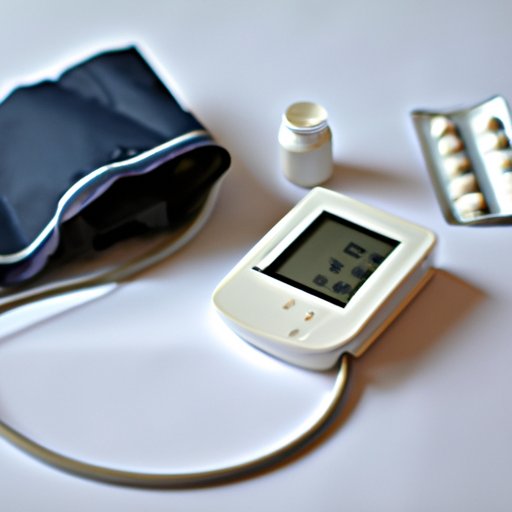Introduction
Managing high blood pressure is crucial for maintaining good health and preventing serious complications such as heart disease and stroke. However, with so many blood pressure medications available, choosing the right one can feel overwhelming. In this article, we will explore the top blood pressure medications of 2021, natural versus synthetic medications, new medications to keep an eye out for, common side effects, combination medications, and lifestyle changes for managing high blood pressure.
Top 6 Blood Pressure Medicines of 2021: Which One Is Right for You?
There are many options available for treating high blood pressure, including ACE inhibitors, beta-blockers, calcium channel blockers, diuretics, and renin inhibitors. Each medication has its own benefits and drawbacks, and the best option may vary depending on individual needs and preferences.
ACE inhibitors, such as lisinopril, work by relaxing blood vessels to improve blood flow and lower blood pressure. Beta-blockers, such as metoprolol, reduce the heart rate to lower blood pressure. Calcium channel blockers, such as amlodipine, prevent calcium from entering the heart and blood vessels, leading to lower blood pressure. Diuretics, such as hydrochlorothiazide, increase urination to reduce blood volume and lower blood pressure. Renin inhibitors, such as aliskiren, block the production of renin, a hormone that can increase blood pressure.
When choosing the right medication, it is important to consider factors such as age, gender, race, co-existing medical conditions, and side effects. Working with a doctor to find the right medication and dosage can help optimize blood pressure management.
Natural vs. Synthetic Blood Pressure Medications: Which One Works Better?
Natural blood pressure medications include supplements such as garlic, omega-3 fatty acids, and coenzyme Q10. Synthetic medications are the pharmaceutical drugs mentioned in the previous section.
While natural approaches may seem appealing, studies have shown that synthetic medications are generally more effective at lowering blood pressure. This is because they contain carefully measured amounts of active ingredients, whereas natural supplements may vary in potency and purity between brands or even batches.
However, natural supplements may still be useful as complementary treatments. For example, garlic has been shown to have a modest blood pressure-lowering effect, and omega-3 fatty acids may help improve blood vessel function.
New Blood Pressure Medications You Need to Know About in 2021
Recent years have seen the development of new blood pressure medications that offer alternative mechanisms of action. One example is sacubitril/valsartan, which combines a molecule that increases levels of a beneficial hormone with an ACE inhibitor for greater blood pressure-lowering effects.
Other new medications include finerenone, a drug that targets a specific hormone that can cause blood pressure to rise, and verinurad, a medication that increases urination to reduce blood volume. Talk to your doctor about whether these medications might be appropriate for you.
The Side Effects of Blood Pressure Medicines: What You Need to Know
Like all medications, blood pressure drugs can cause side effects. Common side effects include dizziness, headaches, nausea, fatigue, and sexual dysfunction. However, these are usually mild and can often be managed by adjusting the medication dosage or switching to a different drug.
In rare cases, medications can cause more serious side effects such as kidney damage, electrolyte imbalances, and allergic reactions. It is important to work closely with a doctor to monitor for these side effects and take appropriate action if necessary.
Combination Blood Pressure Medications: How to Optimize Your Treatment
For some people with high blood pressure, using a single medication may not be enough to achieve optimal blood pressure control. In these cases, doctors may recommend combination therapy using two or more medications with different mechanisms of action.
For example, a doctor may prescribe a diuretic and an ACE inhibitor to address both volume and hormonal factors in blood pressure regulation. Combining medications in this way can be more effective than using a single medication, but it can also increase the risk of side effects. It is important to work with a doctor to find the right combination and dosages for safe and effective blood pressure management.
Lifestyle Changes vs. Medication: Which One Is Better for Managing High Blood Pressure?
In addition to medication, lifestyle changes such as regular exercise, a healthy diet, stress management, and weight loss (if needed) can also help lower blood pressure. These changes work by improving overall cardiovascular health and reducing the workload on the heart and blood vessels.
For some people, lifestyle changes alone may be enough to achieve optimal blood pressure control without the need for medication. For others, a combination of medication and lifestyle changes may be necessary.
It is important to emphasize that lifestyle changes should not be seen as a replacement for medical treatment. High blood pressure can be a serious condition that requires careful management and monitoring by a qualified healthcare professional.
Conclusion
Managing high blood pressure is a critical aspect of maintaining good health and preventing complications. With so many blood pressure medications and treatment approaches available, it can be challenging to find the right one. Talk to your doctor to understand your options and work together to find the safest and most effective treatment plan for you.
Remember that high blood pressure is a complex condition that requires ongoing management and monitoring. Regular check-ins with your doctor and adherence to your treatment plan can help keep your blood pressure under control and reduce your risk of complications.
